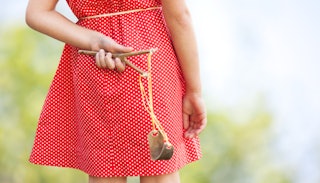Stop Acting Like Your Kid 'Would Never' Because Your Kid Totally Would

Kids have a knack for acting their very worst when people are looking, like in a crowd of other parents. And of course, it’s always when the other kids are being quiet and compliant, polite and twinkly like little powder-scented cherubs, while yours is huffing and blustering and whining like Donald Trump on a Twitter rampage. Or maybe your child has been doing something that really bothers you like eating boogers/pulling people’s hair/being generally creepy, and you’re confiding in an acquaintance or posting for advice in an online forum.
In these moments, the ones that make you cringe inside, every parenting decision you’ve ever made is weighing heavily upon you. You’re almost positive that your ineptitude is to blame for your kid’s shitty behaviors. Maybe it’s too much screen time, or too much processed food. Or maybe I’m just too lenient, you worry inwardly, stewing with shame. Here you are, already wallowing in the feeling that maybe all the other parents are somehow better than you, and then someone twists the knife with an inane statement like “My child does not do that.” Or wouldn’t, or would never, or some variation of straight-up assholery.
Never has any other sentence been so easily blown out of proportion. Because it’s inevitable: When we hear someone say that, we instantly feel like our internal sense of failure has been externally validated. Clearly, if their kid “never” does this terrible thing, that means they’re doing a good job and we aren’t — or so we tell ourselves. But think about how unfair that is, judging the entire shebang by a minuscule cross-section. More importantly, we’re allowing ourselves to base our impressions of their parenting on one ridiculous (and categorically untrue) statement.
If someone is telling me that their kid “never” has a tantrum or acts a fool, then they’re telling me that their kid is never hungry or sleepy or sick or cranky or impatient or angry. Because kids haven’t yet developed the means of properly expressing their displeasure or discomfort, they act like assholes instead.
And unless the parent has some highly developed psychic sense that tells them exactly what that child needs before they need it, 100% of the time (cough, bullshit, cough), I guarantee there are going to be meltdowns. If someone is telling me their kid “never” exhibits weird or troublesome behavior, anything that leaves them wondering if it’s normal, they’re not telling the truth. Period. Those are the people who also claim they never fart. Liars.
Instead of being a judgmental wanker about it, imagine if these people sympathized and were like, “Don’t worry. They all have their moments,” or went a step further and admitted something specific, like, “Hey, I caught mine humping a pillow last week.” Imagine how much pressure that would take off of us — the parents whose normally decent kids are suddenly acting like public nuisances or weirdos-in-training.
Imagine how nice it would be if these sanctimonious twats would just STFU and give us a reassuring smile of solidarity in lieu of a smug comment designed to do nothing but tear us down. I’m not trying to be Dr. Phil over here, but I’d bet my left boob (it’s bigger) that these people have some parenting insecurities of their own, and feeling superior to others helps them cope with their own shortcomings. In other words: It’s not us, it’s them.
Listen. All kids — one hundred percent of them, no matter what kind of stellar job their parents are doing — do embarrassing, dangerous, mortifying, ridiculous, rage-inducing, worrisome things once in a while. And even if someone else’s kid has never done whatever pearl-clutchingly horrifying thing your child is currently doing, it doesn’t mean theirs is better than yours, or that their parenting style is somehow higher-quality. All it means is that, at this particular moment, their kid is not acting like a dick. But you can bet that, behind closed doors (if they’re lucky), they too are looking at their child, at least occasionally, and wondering, where the hell am I going wrong?
This article was originally published on